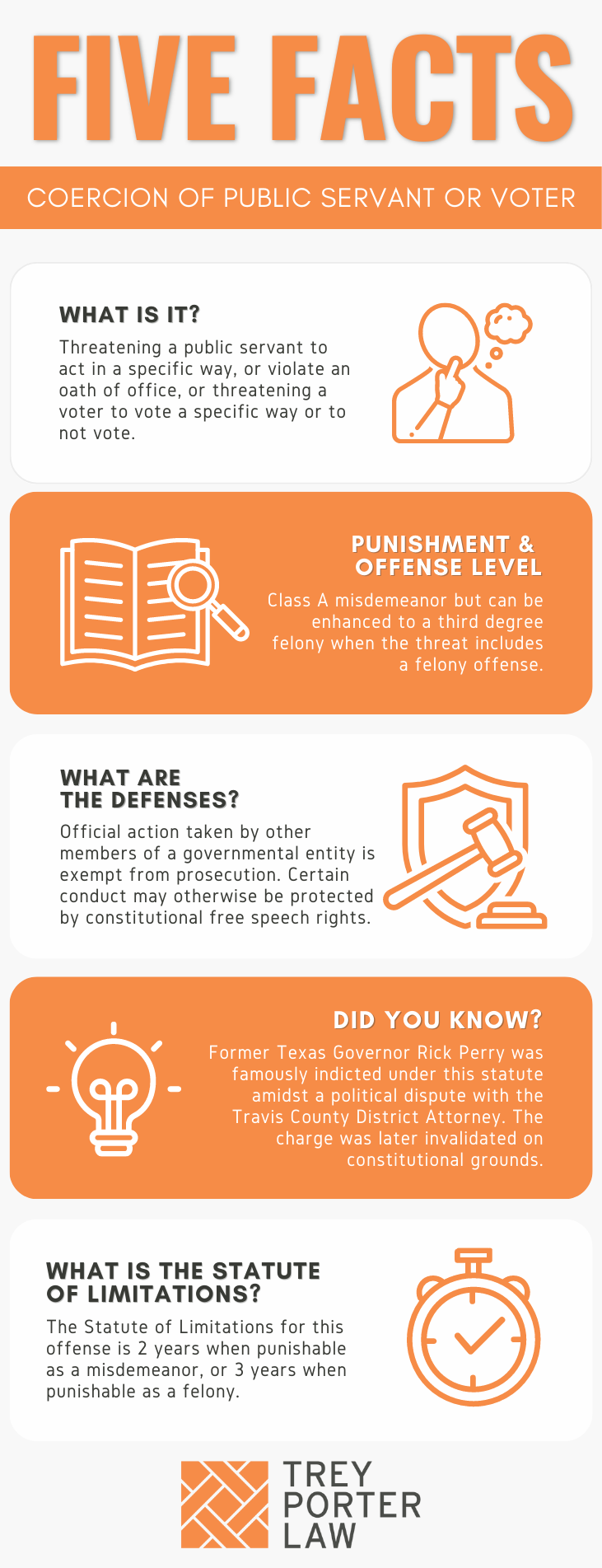WHAT IS COERCION OF PUBLIC SERVANT OR VOTER IN TEXAS?
The Texas law against coercion of a public servant or voter prohibits threatening another in an attempt to influence the public servant’s official actions or another’s voting decisions.
WHAT IS THE COERCION OF PUBLIC SERVANT OR VOTER LAW IN TEXAS?
Tex. Penal Code § 36.03. COERCION OF PUBLIC SERVANT OR VOTER.
(a) A person commits an offense if by means of coercion he:
(1) influences or attempts to influence a public servant in a specific exercise of his official power or a specific performance of his official duty or influences or attempts to influence a public servant to violate the public servant’s known legal duty; or
(2) influences or attempts to influence a voter not to vote or to vote in a particular manner.
(b) An offense under this section is a Class A misdemeanor unless the coercion is a threat to commit a felony, in which event it is a felony of the third degree.
(c) It is an exception to the application of Subsection (a)(1) of this section that the person who influences or attempts to influence the public servant is a member of the governing body of a governmental entity, and that the action that influences or attempts to influence the public servant is an official action taken by the member of the governing body. For the purposes of this subsection, the term “official action” includes deliberations by the governing body of a governmental entity.
WHAT IS THE PENALTY CLASS FOR COERCION OF PUBLIC SERVANT OR VOTER IN TEXAS?
Coercion of a public servant is a Class A misdemeanor, punishable by up to one year in county jail. The penalty classification increases to a third degree felony, punishable by two to ten years in prison, if the person coerces a public servant or voter by threatening to commit a felony.
WHAT IS THE PUNISHMENT RANGE FOR COERCION OF PUBLIC SERVANT OR VOTER IN TEXAS?
Coercion of a public servant or voter charged as a Class A misdemeanor carries up to one year in jail, and a maximum $4,000 fine. If charged as a third degree felony, it carries between two and ten years in prison, and up to a $10,000 fine.
WHAT ARE THE PENALTIES FOR COERCION OF PUBLIC SERVANT OR VOTER IN TEXAS?
A person charged with coercion of a public servant or voter may be eligible for probation after a conviction, or deferred adjudication without a conviction. The maximum period of community supervision for Class A misdemeanor coercion of a public servant or voter is two years. If charged as a third degree felony, a person may be placed on either type of community supervision for no more than ten years.
WHAT ARE THE DEFENSES TO COERCION OF PUBLIC SERVANT OR VOTER IN TEXAS?
The First Amendment protects free speech, so a person may argue the alleged coercive words and conduct were constitutionally protected speech. Public servants, specifically, have a First Amendment right to engage in expression, even threats, regarding their official duties.
The statute further exempts public servants from criminal liability for threats to take or withhold action as a public servant, or to cause a public servant to take or withhold action. The prosecution must negate the statutory exception by pleading and proving the defendant is not acting under the color of his or her governing body when making a threat, or does not belong to a governing body.
WHAT IS THE STATUTE OF LIMITATIONS FOR COERCION OF PUBLIC SERVANT OR VOTER IN TEXAS?
The limitation period for coercion of a public servant or voter charged as a Class A misdemeanor is two years. If charged as a third degree felony, the limitation period is three years.
COERCION OF PUBLIC SERVANT OR VOTER IN TEXAS
Coercion of a public servant or voter, unlike bribery, is not an offer or agreement for a benefit in exchange for an illegal exercise of a public duty. Rather, coercion of a public servant or voter is an attempt to influence another’s action with threats.
TEXAS COERCION OF PUBLIC SERVANT OR VOTER COURT CASES
The case law regarding coercion of a public servant or voter in Texas shows the Court of Criminal Appeals’ determination that the statute is, in part, unconstitutional.
- In Ex parte Perry, Texas Governor Rick Perry threatened to veto funds for the Travis County District Attorney’s Office if the District Attorney, Rosemary Lehmberg, did not resign. He was indicted for coercion of a public servant. The definition of “coercion” used in this case—to take or withhold action as a public servant, or to cause a public servant to take or withhold action—is unconstitutionally overbroad.Political logrolling, or the swap of one authorized official act for another, is not extortion. And speech does lose its First Amendment protection simply because it embarrasses or coerces others into action. Indictment dismissed.
- In many circumstances, the statute’s application will be within constitutional limits. For example, in Phillips v. State, the defendant called 911 demanding an officer come to his home. He told 911 operators not to send a particular officer, whom the defendant identified by name. He said he would “blow [the officer’s] brains out.” The defendant was convicted of coercion of a public servant, and terroristic threat, and the appellate court affirmed. The defendant threatened to commit the felony offense of assaulting a peace officer to the 911 operator, a public servant, in an attempt to influence her performance of her official duty.

















